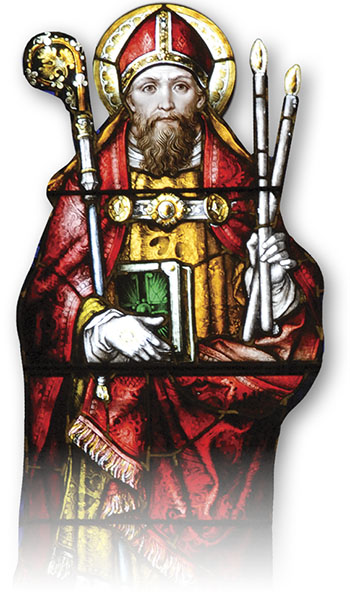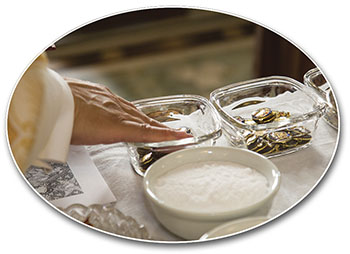Before dedicating himself to saving souls, St. Blaise healed bodies: he was a physician. It so happened that one day a woman went to the bishop in affliction and begged him to cure her little son who was at the brink of death because of a fish bone lodged in his throat.
Given the extreme circumstances, the Saint decided to appeal not to medicine but to the power of God: he took two candles, crossed them over the boy’s throat and gave him his blessing. Immediately the bone popped out and the boy was saved. In memory of this event, the Church began to bless candles, and with them the faithful, on the feast of St. Blaise, bishop and martyr, celebrated on February 3, to preserve them from throat ailments.
A reality very present in our lives
Let’s look at the episode just described: together with the symbolic act of joining the two candles, St. Blaise gave a blessing to the child in need. This is a reality familiar to us, perhaps without our understanding it fully: the value of a blessing.

St. Blaise – Cathedral of Salta (Argentina)
For Catholics, it is something commonplace: many ask for objects, vehicles or houses to be blessed… However, what becomes habitual in a person’s life tends to lose value in their eyes as time goes by. And in the case of blessings, something even worse can happen when superstitious ideas are added to their true concept. But the fact is that the faithful normally have some idea of the existence of supernatural realities, even without having an in-depth understanding of them.
As St. Thomas Aquinas explains,1 there is a supernatural “light” which, when it falls upon our reason, gives us a superior knowledge that surpasses intellectual capacity; this light of faith – lumen fidei – is received at Baptism. It illumines man’s intelligence, allowing him to somehow glimpse the reality of what he believes and thus assent to the divine truth, rejecting what differs from it, even without having received an explanation. It is this light which enables the baptized to fathom the invisible and unknown value of a blessing.
However, so great is the confusion of minds today that it is becoming increasingly common for accurate knowledge to be mixed with mistaken notions on the subject. A good remedy for this is for us to find out what the Catholic Church teaches on the subject.
Blessings in the Old Testament
“For a father’s blessing strengthens the houses of the children, but a mother’s curse uproots their foundations” (Sir 3:9).
The ancients used these terms with precision and were well aware of their reality, perhaps from personal experience. Up to the present day, the word blessing has been enriched with nuances and meanings – especially since the coming of Our Lord Jesus Christ to earth and the founding of the Holy Church – without, however, losing its original characteristics.
In the Hebrew language, blessing derives from the noun berākā, which basically means the power that works salvation. From this word comes the name Baruch – the blessed one – the Old Testament prophet, disciple and helper of Jeremiah in his mission to the Israelites (cf. Jer 32:12-13). But the Eastern mentality, in its natural understanding of the symbolic value of things, discerned yet other predicates in this term.
Indeed, the ideas of blessedness as happiness were present in the act of blessing or receiving a blessing. Thus, in addition to being a source of spiritual strength, the Israelites saw it as a seal on their destiny, certain that this privilege would not be cancelled, since it came from the Creator, who determines and guides the future of men:
“God said to Balaam, ‘You shall not go with them; you shall not curse the people, for they are blessed’” (Nm 22:12).2
There was also a natural aspect. It was the Lord who made the fields fertile, life long and labour productive, and this too was a blessing: “You shall serve the Lord your God, and I will bless your bread and your water; and I will take sickness away from the midst of you” (Ex 23:25).
With the coming of Christ, blessings were enriched
When the fullness of time had come, the blessing reserved for the chosen of the Old Testament was also granted to the new chosen people, the Holy Catholic Church. By His Birth, Death and glorious Resurrection, Our Lord Jesus Christ extended to the Gentiles the blessing of Abraham, so that by faith they might receive the promise of the Spirit (cf. Gal 3:14).
The notion of blessing continued to be linked to divine protection; protection from evil, and strength and prosperity; both physical and spiritual. However, this reality had been enriched by the Incarnation of the Word, for the God-Man himself left His blessing to those who were the first living stones of the Church He founded: “Then He led them out as far as Bethany, and lifting up His hands He blessed them. While He blessed them, He parted from them, and was carried up into Heaven” (Lk 24:50-51).
Our Divine Founder, desiring our holiness, made us heirs of the blessing (cf. 1 Pt 3:9) and left us the Church as a mother, endowing her with special privileges in the distribution of her riches (cf. Rom 15:29), through her sacred ministers. Thus, although the blessing is pronounced by men, it ultimately comes from God.3
Healing souls and healing bodies
With the sacramental, the Holy Church has attached to certain objects and gestures, accompanied by a movement of reverence towards God and divine things, the forgiveness of venial faults and the obtaining of spiritual benefits. Unlike the Sacraments – which directly produce grace – sacramentals dispose us to receive it.4 They include priestly blessing, the use of blessed medals and scapulars, and the simple act of blessing oneself with holy water.

It should be remembered that the power of blessing and of blessed objects also extends to the healing of bodies. Let us illustrate with a few examples.
A noble lady of Antioch once sought out St. John Chrysostom to pray for the healing of her youngest son, who was seriously ill. The Saint followed the path indicated by the lady and upon arriving there he gave a blessing to the dying lad and sprinkled him with holy water. The grace of healing was obtained in short order.
Another case, in Italy, concerned a little girl suffering from such a severe case of mumps that it threatened to be fatal. She could take nothing but a little milk, and even that with great difficulty. Although the doctors had given her up for dead, her uncle did not hesitate to ask for help from a priest with a reputation for holiness, called Leopoldo, who lived in Padua. The priest gave him an apple that he had blessed and told him to give it to the child. Upon receiving the fruit, the young girl ate it eagerly and soon recovered.
The healing of souls, however, is often more miraculous and impressive… In 1904, an event occurred which proves the existence of a special power in blessed objects of piety.
In the Spanish city of Lleida, a young man of scandalous life was admitted to the hospital after having received two stab wounds. In spite of his serious condition, he blasphemed and threatened to attack anyone who tried to talk to him about God. This earned him the epithet “the devil”. The nuns caring for him realized that human solutions had been exhausted and appealed to a “higher authority”. Redoubling their prayers for the unfortunate man, they covertly placed a blessed Miraculous Medal under his pillow. Shortly afterwards, “the devil” asked a priest to attend him in Confession, showing sincere repentance for his faults.
The privilege of indulgences
In addition to these extraordinary benefits which blessings hold for man, they are often accompanied by indulgences.
These are the remission before God of the temporal penalty attached to sins whose guilt has already been forgiven. The faithful who are duly disposed may obtain indulgences through the Church, who has the authority to apply the treasury of the satisfactions of Our Lord and the Saints. An indulgence is partial or plenary, depending on whether it remits this penalty in part or in whole.
Here, more than in other cases, we see that the closer to God is the one who blesses, the richer the privilege will be: “The faithful who use with devotion an object of piety (crucifix, cross, rosary, scapular or medal) properly blessed by any priest, can acquire a partial indulgence. But if this object of piety is blessed by the Supreme Pontiff or any bishop, the faithful who use it devoutly can also acquire a plenary indulgence on the feast of the holy Apostles Peter and Paul, provided they also make a profession of Faith using any legitimate formula.”5
In this way, as if exuding a “fragrance of God”, the blessed objects begin to diffuse divine benefits. And some privileged souls have been able to “sense” the gentle presence of this of this supernatural aroma.
Souls who “sense” the sacred!
Coming from the Greek language, the word hierognosis means knowledge of the sacred. This is the name mystical theology gives to the special gift granted by God to certain souls throughout history, by which they were able to sensibly recognize blessed objects, distinguishing them without hesitation from others.
An eloquent example is found in the life of the mystic Louise Lateau, born in Bois d’Haine, Belgium, who surprised eminent doctors and theologians. When she received blessed objects, even if they were not precisely sacred or religious, she would smile with satisfaction, ready to kiss them, while she was completely indifferent towards those that were not blessed.

A priest blessing medals and salt
Her discernment was such that a disguised priest, dressed as a layman, was once presented to her with an unblessed crucifix in his hands. The object did not impress her at all. Turning his back to her, the priest traced the sign of the cross on the same object. Turning round again, Louise immediately smiled and said: “See what a great thing the priestly blessing is, of which so little account is made…”6
The testimonies of these souls, rewarded by Providence with such a lofty gift, are valuable, for they help us to recognize the incomparable value of sacred things.
What is more, they make us realize that there is a God who wants to save us, and who with immense generosity has placed invaluable spiritual goods at our disposal, so that we may be more easily united with Him. In this way, by comprehending the value of a blessing, we more clearly see our heavenly Father’s infinite love for us.
It remains for us, therefore, to implore Him to pour out His blessings upon humanity with ever increasing abundance, and that they may guide and sustain us during our pilgrimage in this vale of tears, filling us with supernatural riches for eternal life. ◊
Notes
1 Cf. ST. THOMAS AQUINAS. Summa Theologiæ. II-II, q.1, a.4, ad 3.
2 Cf. JANOWSKI, Bernd. Bênção/Maldição. Antigo Testamento. In: BERLEJUNG, Angelika; FREVEL, Christian (Orgs.). Dicionário de termos teológicos fundamentais do Antigo e do Novo Testamento. São Paulo: Loyola, 2011, p.124-125.
3 Cf. SCHOLTISSEK, Klaus. Bênção/Maldição. Novo Testamento. In: BERLEJUNG; FREVEL, op. cit., p.125.
4 CCC 1670.
5 ST. PAUL VI. Indulgentiarum doctrina, norm 17.
6 ROYO MARÍN, OP, Antonio. Teologia da perfeição cristã. 4.ed. Anápolis: Magnificat, 2020, p.851.


